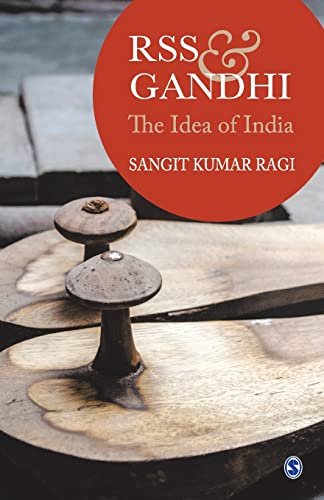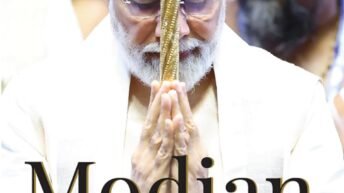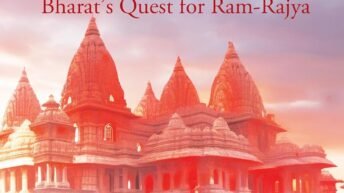|
Listen to article
Getting your Trinity Audio player ready...
|

Academic scholarship for long has portrayed Mahatma Gandhi and RSS as polar opposites in Indian political thought. Their ideas have been presented as two entirely different streams of thought without any overlap. The sketch gets murkier for the RSS as it is claimed to be the nemesis of Gandhi and is also blamed for its alleged “involvement” in the conspiracy that resulted in the latter’s political assassination. Notwithstanding the continuous RSS-bashing by academia in this context, it is quite surprising that rarely have attempts been made towards an in-depth, sustained academic engagement on the relationship between the political trajectories of Mahatma Gandhi and the RSS. A recent book titled ‘RSS & Gandhi – The Idea of India’ (SAGE Publications, 2022) by Dr. Sangit Kumar Ragi attempts to fill this gap.
A detailed study of the subject reveals substantial overlap between the worldviews of Mahatma Gandhi and the RSS as an organization. Both are steeped in the socio-cultural milieu of Bharat and their political philosophy germinates with deep roots in the Indic Lebenswelt (living world). While Gandhi emerges as a Hindu saintly spiritualist who believes that politics should be governed by the ethics and morals of religion, the RSS shapes itself as a socio-cultural movement which assigns an outrightly political dimension to the role of religion. Both Gandhi and RSS draw their ideas from the civilizational experience and history of Bharat, with Hinduism serving as the foundation. In this book, the author attempts to undertake a comparative analysis of the positions of Gandhi and RSS on a range of themes (such as the conception of the Indian nation, Hinduism, religious conversion, reformation of Hindu social order, cow protection, et. al.) and brings them out as different shades of Indic-rooted philosophies. The author also captures well the important distinctions and subtleties in the thought processes of both, which no doubt has serious implications for the means and methods for Indic rejuvenation adopted by them.
According to the author, both Gandhi and RSS are staunch believers in the antiquity of the Indian nation and are opposed to the arguments presenting the idea of the Indian nation as a colonial construct and the exaggerated emphasis on diversity (read as fundamental differences) to prove that the idea of India has been stitched together only as a result of British colonization. Instead, both of them argue that India “is an ancient nation making its eternal journey, in which saints and seers cultivated and nurtured it in the civilizational form”. (p. 20) Gandhi and RSS both acknowledge the sacred geography of Bharat, which is a living proof of the pluri millennial history of this nation. While Gandhi accepts the antiquity of our civilization, as a matter of fact, he isn’t concerned with a historical, evidence-based assessment of the same. Gandhi’s understanding of Bhartiya civilization is both ahistorical and free from the constraints of a teleological approach. However, the RSS situates itself very much amidst such debates around history, archeology and the interpretation of scriptures and takes the onus of proving Bharat’s ancient origins head-on. Gandhi conceptualizes our civilization as having a “mosaic culture” (p. 32) with a strong power of assimilation, although his reference points for the description of the essence of our civilization remain largely Hindu. RSS, on the other hand, is much more vocal about Bharat being a Hindu Rashtra and Hindutva being at the core of this civilization. The author has brilliantly articulated the dynamics of these two streams of thought which have played a critical role in shaping our idea of India, that is Bharat.
As mentioned earlier, the author has delved into a range of themes including the ever-controversial question of the religious conversion of Hindus to Christianity and Islam. He convincingly argues that both Gandhi and RSS are opposed to religious conversion as they are able to see through the hidden agendas behind such conversions. RSS seems to be outspoken about the agenda of “de-Hinduization” (p. 84) and de-nationalization, but Gandhi is more occupied with the fraudulent means and material allurements used to induce religious conversions. The author’s analysis gives us an interesting perspective about Gandhi and the question of religious conversions. Gandhi’s opposition to conversions is more fundamental in a sense, as he sees conversions as a genuine “spiritual transformation of the soul” (p. 85), which can only be wholly voluntary. He even goes to the extent of absolutely denying the need for conversion for a truly religious person, as such an individual would be able to fully imbibe the religiosity and spiritual well-being provided by one’s native religion (all religions being in principle complete in themselves).
Both Gandhi and RSS, despite their respective tremendous efforts towards the reformation of the Hindu social order and the abolition of untouchability, have been consistently criticized as perpetuators of caste discrimination. On the contrary, the author’s analysis sheds light on their commitment to the eradication of caste hierarchies and the discrimination they imply. Gandhi and RSS don’t rely on the state for the removal of social disabilities and backwardness, but rather work towards sparking initiatives within the Hindu fold itself to remedy the dire situation of the lower castes. The author has also extensively covered the overlap in the critique of Western modernity, ‘civilization’ and industrialization, developed in the two respective theoretical frames and shown how both see Swadeshi as the vision for an economic overhaul of India. The author states, “Both Gandhi and the RSS want a constructive contact between the modern and Indian civilization, but both are dead against the implantation of the Western culture and Western civilization in India.” (p. 310) Since the reviewer doesn’t intend to reveal too much, he has limited himself here to discuss a few significant themes picked up by the author, hoping to generate further interest in the readers to go through the entire work.
This book by Dr. Ragi is surely a refreshing academic perspective on the interaction of two critical worldviews of Indian political thought. The RSS has been a votary of Gandhian ideas since its inception, but it was never able to receive the scholarly attention it deserved. With its own set of theorists, public intellectuals, and original political thinkers, the RSS’s line of thought definitely deserves to be studied objectively and critically as a part of the larger pantheon of Indian political philosophy. While the book is pretty ambitious in its scope, it could have done better by also highlighting the different political shades within the RSS rather than treating it as a monolith. The positions of Gandhi could also have been explained better by tracing their slow evolution over time. Nevertheless, this book is timely in addressing the vacuum in scholarship on this much-contested subject. One can only hope that it shall lead to further rigorous academic work on each of the themes covered, which remain quintessentially relevant in Indian politics and society.






Add comment